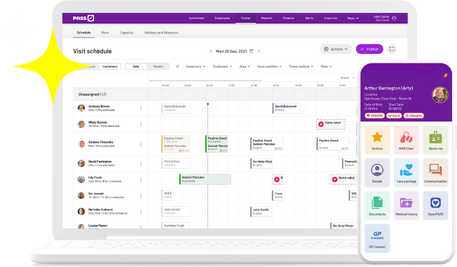A registered manager is the person responsible for a care service. Whether you work for a domiciliary care agency or in a residential care facility, there will be a registered manager making sure that the organisation provides good care.
Clients and care workers should all know about the role of a registered care manager. If you’re a service user or family member, the registered manager might be your point of contact for concerns and enquiries.
If you’re a care worker, you might want to progress in your career and become a registered manager yourself one day.
In this article, we’ll look at what a registered manager is, how to become a registered manager, and what qualifications and experience you’ll need.
Note: Most GP surgeries and dental practices also have a CQC registered manager. However, this article looks in detail at registered care managers, who oversee the running of social care organisations.

Table of Contents
What is a registered manager?
A registered manager is in charge of the day-to-day running of a care service.
They’re responsible for the quality of care and support delivered, the care team, and making sure that the service complies with all regulatory requirements.
Digital tools like care planning software make this easier, keeping care plans accurate and accessible for the whole team.
They must register with the Care Quality Commission (CQC). The registration process is quite in-depth, and requires prospective managers to prove that they can meet the needs of their clients. Until their registration has been accepted by CQC, an applicant cannot manage a care service.
While they might not deliver personal care themselves, many registered managers began their careers as support workers. To register with CQC, a care manager must show relevant experience and qualifications – so all CQC registered managers should understand what it’s like to support vulnerable people.

What is a nominated individual?
You might see the term nominated individual mentioned.
A nominated individual is someone with strategic responsibility, and the main contact between CQC and the care provider.
They are usually a senior person in their organisation, such as a director or chief executive, and ultimately have the responsibility for putting in place the policies and procedures to ensure regulatory compliance.
To understand the role of the nominated individual and the registered manager, let’s look at an example care organisation:
The Good Care Home Group runs two care homes, and also has a team of directors and admin staff who work in a head office.
Taylor is the Home Manager at Care Home One, and Balbir is the Home Manager at Care Home Two.
They each work at their care home day-to-day. Sam is the Operations Director for the Good Care Home Group, and works at the head office, with some travel to each care home.
Taylor is the registered manager for Care Home One, and Balbir is the registered manager for Care Home Two. Sam is the nominated individual for both care homes.
In some organisations, the registered manager and nominated individual roles might be filled by the same person – for example, in a small independent care home.
What are the responsibilities of a CQC registered manager?
A registered manager is responsible for all of the day-to-day operations in a location, including:
- Ensuring that their clients receive high quality care
- Making sure that the care service complies with regulatory standards
- Safeguarding their service users
- Managing care staff, including rosters, hiring and training
- Managing budgets and resources
- Being a key point of contact for CQC
Many managers now use care management software to help with these responsibilities. It brings care planning, rostering, medication, and reporting into one system, making it easier to stay compliant and keep services running smoothly.
A typical day for a care manager might include planning rosters, carrying out care assessments for clients, holding staff reviews, and meeting with family members to discuss concerns.
In larger care facilities, a registered manager may be supported by care supervisors, administrators, and other staff members who do some of this work. However, the final responsibility rests with the CQC registered manager.

Can a care company run without a registered manager?
Care service providers need to have a registered manager.
This applies whether the organisation is a for-profit business or a charity – what matters is that the service provides a regulated activity, such as personal care.
Domiciliary care agencies and residential care facilities must have a registered manager.
Sheltered housing, supported living solutions and extra care housing schemes should also have a registered manager, if they provide personal care for their residents.
In home care settings, home care software can give managers real-time visibility of visits, staff punctuality, and client outcomes.
However, if you are an individual providing domiciliary care to one client, you may not need to be a registered manager. For example, if you’re a family member or friend providing personal care, or a care worker directly employed by your client, you don’t usually need to be or have a registered manager.
Support your registered manager with PASS 👩💼
PASS brings care planning, rostering, eMAR, and reporting together in one secure system — giving registered managers the oversight they need to run safe, compliant services. Real-time updates, digital records, and clear audit trails make inspections simpler and day-to-day management easier.
Book a tour today to see how PASS can support your registered manager and your whole organisation.
How do I find out who a registered manager is?
In most cases, the registered manager of a care home or domiciliary care agency will be the person who is obviously in charge.
Their job title might be Home Manager, Care Manager, or General Manager. However, in some cases, it’s not that simple.
If your organisation doesn’t provide care for all of its clients, the CQC registered manager might not be the general manager.
For example, at a sheltered housing scheme, there may be a separate housing manager and registered care manager. Alternatively, at a care agency or residential facility, the owner might not be the registered manager.
There are a few ways you can find out who the CQC registered manager is:
- Search for the care provider on the CQC website. The registered manager should be listed there.
- Look for the CQC ratings poster in the care home. This should be displayed in reception or somewhere else obvious, and it should include details of the registered manager.
- Check the organisation’s website. Details about the staff team, including the registered manager, will probably be included here.
- Ask a member of staff. Everyone working at the location should know the registered manager is.

How do you become a CQC registered manager?
If you’re a carer, you might want to become a registered manager some day.
Lots of registered care managers started their careers as support workers, either as a family carer or working for a care home or domiciliary care agency.
To become a registered care manager, you’ll need to show that you can safely manage a care service. This includes being able to ensure there’s a high quality of care at all times, manage your staff team, and understand relevant legislation, as well as your organisation’s policies and procedures.
Some people become CQC registered managers when they start their own care service, either a domiciliary care agency or residential facility. Others will work for existing providers, often larger organisations as the registered manager of one location.
How to become a registered manager will vary between care providers, as companies will have different requirements for their managers.
You should talk to your supervisor or HR team about specifics within your organisation. Alternatively, look at job postings for registered care managers in your area – what qualifications and experience do they require? However, there are some tips that can help any care worker progress.
How to progress in your social care career:
- Look for general training opportunities, especially related to your interests and your clients’ needs. For example, you might consider training in areas such as diabetes, dementia support, or end of life care. Keep on top of your mandatory training, too.
- If you can identify any skills that you need to improve, such as computer literacy or maths, consider taking courses in these topics. Your organisation might help you access these courses, or you could take classes at a local college or online.
- Take leadership training courses, such as the Level 5 Diploma in Leadership for Health and Social Care.
- Attend reviews with your line manager, and discuss your career plans. If your managers know that you want to progress into a supervisory role, they may be able to offer advice, and let you know when opportunities are available.
- If there are roles that particularly interest you, ask colleagues or managers if you can arrange a shadowing shift.
- Look for opportunities for promotion. If you see roles advertised such as care supervisor or care co-ordinator, apply for them. You will need relevant management experience to become a CQC registered manager.
What qualifications do I need to be a CQC registered manager?
You don’t need a degree to become a registered care manager, but you will need some qualifications and experience.
The CQC requirements to become a registered manager include:
- Relevant management experience, such as working as a care supervisor
- Experience working with similar service users
- Recent experience working in social care
- An enhanced DBS certificate issued less than 12 months ago
- Relevant qualifications
The relevant qualifications to become a CQC registered manager may vary, depending on the service users you’ll support. They will usually include leadership qualifications, such as the Level 5 Diploma in Leadership and Management, or the Level 5 Diploma in Leadership for Health and Social Care.
If you work in a care facility that specialises in certain conditions, you may need additional qualifications. Alternatively, you may have a nursing or social work degree, or a postgraduate qualification in management.
How do I register with CQC?
If you’re in charge of a care service, it’s time to register with CQC.
Before you register, there’s some information you’ll need:
- Your full employment history, from the age of 16 onwards
- Your DBS certificate
- Contact details for your GP
- Contact details for your last employer
- A copy of any relevant qualifications and training – for example, degree certificates or diplomas
Once you’ve prepared this information, you can find the application forms on the CQC website.
There are different forms, depending on your situation:
- The “New registered manager” form, if you are being employed as the new manager of an existing service, registering your own care service for the first time, or being hired as registered manager at a newly-opened facility. CQC also provides an additional form for registered care managers with responsibility for multiple locations.
- The “Continue under a new provider” form, if your facility is being taken over by a new provider but you are continuing as manager.
In your application, you’ll need to prove that you are the right person for the role.
This includes showing that you have the necessary qualifications, relevant management experience, and a good understanding of laws and regulations around social care. You may also need to show that you can handle some of the day-to-day tasks of a registered manager, such as handling complaints and safeguarding issues.
Once you have submitted your form, CQC will assess your application. This may take a few months, and you won’t be able to act as the registered manager until your registration is confirmed.
Conclusion: CQC care managers and their role
The CQC registered manager is an important role.
The registered care manager oversees the day-to-day running of a care service, and is responsible for all service users and staff members in their facility or agency.
To become a registered manager, you’ll need to show relevant experience and qualifications. Many registered managers have had long careers in care. That experience helps them understand how to provide a high quality service for their clients.





